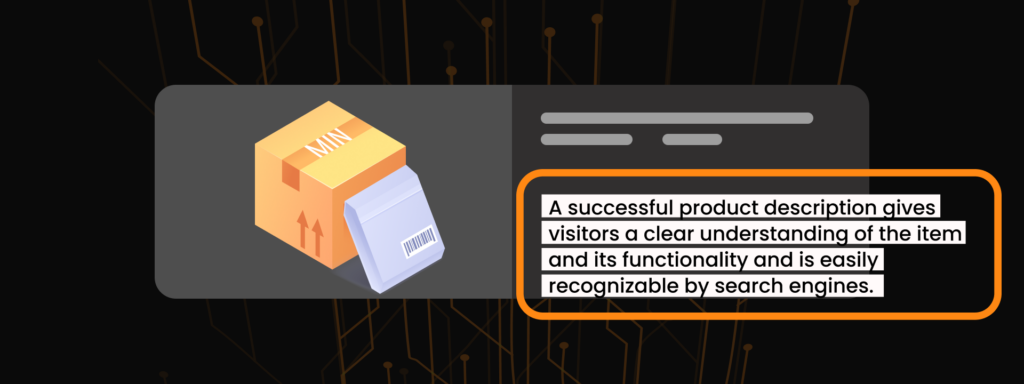Long gone are the days when artificial intelligence was an abstract term you only heard in sci-fi movies. These days, small and big companies use artificial intelligence in eCommerce to create a better customer experience and make data-driven decisions. In 2022, 76% of businesses implemented widespread or partial adoption of AI into their work operations.
From chatbots to personalized product lists, AI-powered software transforms the eCommerce world. Simply put, AI predicts shopping patterns based on what items customers purchase and when they buy them. Based on that data, online retailers can improve the user experience and increase sales.
In this article, we’ll talk about how artificial intelligence affects the eCommerce landscape and what AI-powered tools the eCommerce businesses use.
Use of Artificial Intelligence in eCommerce
You’ll be surprised to learn that 63% of eCommerce business owners actually implement AI-powered tools in their work but aren’t aware that it’s considered AI. According to the statistics, 66% of users claim they are interested in AR assistance when shopping online. So, let’s review some of the most efficient use cases of AI in eCommerce.
Chatbot

Manual customer support is a resource-consuming and inefficient way of communicating with your customers. Let’s imagine that a visitor stumbled upon your online store late at night, in the middle of their compulsive shopping spree. If they have a question or need to clarify something, it’s essential to provide them with immediate assistance. If your customer support gets back to them in the morning, chances are they have already forgotten about your store or found the products somewhere else.
Having round-the-clock customer support is expensive, especially if you are just getting started. AI-powered intelligent chatbots are a solution that many eCommerce businesses adopt. At first, the capabilities of chatbots were quite limited, but now the technology has expanded to the point where the software can recognize user aggression or disappointment and redirect such users to human managers. The numbers speak for themselves: the chatbot market is expected to reach $1.25 billion U.S. dollars in 2025, while it was at $190.8 million U.S. dollars in 2016.
Let’s sum up the advantages of chatbots:
- 24/7 support. There’s no time limit for solving customers’ issues. Your users get on-the-spot decisions for the majority of their most common problems.
- Improved customer support efficiency. With a chatbot, you can reduce the human error that occurs when handling general problems.
- Cost-efficiency. The chatbot can handle more customers simultaneously compared to human support. It also reduces the costs spent on the human resources that handle customer issues.
Product Description

Product descriptions play one of the key roles in turning visitors into customers. A successful product description gives visitors a clear understanding of the item and its functionality. They also play crucial role in SEO and are easily recognizable by search engines. Read more about the significance of SEO for eCommerce in the article:
SEO for eCommerce Stores: Everything You Need to Know About It.
Usually, writing product descriptions is a task for content managers and copywriters. It takes a lot of time to write a short yet exhaustive description covering all aspects of the items in question. AI-powered tools can auto-generate product descriptions with the help of machine learning and complex algorithms, so your team won’t need to spend long hours writing them manually. All you have to do is proofread the descriptions and make minor changes when needed. This way, AI saves time, cuts costs, and reduces errors that often occur during manual product description creation.
Deeper Level of Personalization

Personalization is nothing new in the world of eCommerce. Offering personalized lists of products or complementary items isn’t something that makes you stand out from the crowd; it’s what your customers expect you to do. Lately, developments in machine learning, data learning, and artificial intelligence technologies have led to a deeper level of personalization.
In particular, you get to create personalization across multiple devices. Such AI engines like BoomTrain allow you to track multiple consumer touch points, which increases engagement, retention, and lifetime value.
Whether it’s a mobile app, website, or email campaign, the AI engine monitors all channels and creates a universal consumer view. In this way, eCommerce businesses get to provide an exceptional customer experience.
Cybersecurity

Did you know that 95% of cybersecurity breaches are caused by human error? These days, regular users are attacked by everything from phishing to malware attacks. Hence, you need a proactive approach to cyber attacks rather than a reactive one.
When artificial intelligence is utilized, a huge amount of data is gathered, including new threats, breaches, and cyber attacks. With time, AI can spot anomalies in the system and alert the team. The employees can take preventive measures when such issues are found.
The benefit of machine learning is that it finds correlations faster than a human team. And blocking potentially malicious behavior ensures the safety of the company’s data and its clients’ data. And if cyberhackers manage to get through, AI-powered tools significantly reduce the time intruders spend within the system.
The data regarding cybersecurity can be centralized and stored on one server, simplifying the process. The information can be accessed once the server is breached, and the company can take the necessary security measures.
We utilize the latest technology in the eCommerce development
Leave us your contact info to get help with your eCommerce business
Voice Assistant & Voice Search

The appearance of such programs as Alexa or Siri changed how people interacted with their devices and the Internet. In 2020, 120.8 million people in the United States used voice assistants at least once a month, and the numbers are only increasing.
Thanks to artificial intelligence, there have been significant improvements in speech analysis and contextual reasoning. It has led to much more accurate voice recognition. All of these allowed customers to have a speak-browse-purchase shopping experience that saves lots of time. Additionally, voice search also reduces the chances of errors that occur due to manual typing.
Image recognition & visual search

Every one of us has experienced the struggle of not knowing how to search for the products we needed at least once. Or rather, how to put their request into words. This is where search by image or reverse image search comes to the rescue. AI-powered software and complex algorithms can help identify the products that users are searching for and bring up similar results.
Additionally, image recognition is used by eCommerce companies to recognize product images and tag them. More and more eCommerce big companies, such as Amazon, are introducing image search functionality in their online stores, allowing customers to search for products using pictures.
Benefits of Artificial Intelligence in eCommerce
The potential for eCommerce companies to take advantage of AI is immeasurable. And the benefits of it will only continue to grow as the technology develops. Right now, we’ve highlighted four main benefits of the use of artificial intelligence for the eCommerce industry.
Improved customer assistance

Even with the best customer support team, you most likely won’t be able to offer round-the-clock assistance. And if you sell worldwide, chances are that customers will have questions or face issues throughout all day and night. AI-powered software, like chatbots, can handle customer requests 24/7.
Moreover, even the most efficient members of the customer support team won’t be able to handle more than a couple of requests simultaneously. In contrast, chatbots can handle multiple queries at the same time.
The idea is not to get rid of the customer support team altogether but to make their work more efficient. With chatbots handling the frequently asked questions or the most common issues, your team can focus on the more complex issues and spend more time figuring out the high-priority queries.
Boosted Conversion Rates

Everyone knows that conversion rates are among the hottest topics for eCommerce business owners. Conversion rates show how many people take the desired actions on your website, from purchasing a product to subscribing to your email newsletter.
Artificial intelligence affects conversion rates in several ways. For instance, it helps in the prevention of abandoned shopping carts. Abandoned shopping carts are a common issue among eCommerce businesses. Using artificial intelligence, you can gather data about site visits and determine the most common reasons for the problem. You can also send the customers automated abandoned basket inquiries. Whether it’s an email reminder about the left cart or a discount code on the items in the left cart, it often encourages customers to proceed with their purchases.
Personalized Customer Experience

71% of online shoppers expect a personalized shopping experience. When it comes to offline shopping, it’s much easier to provide a personalized experience because whenever a customer walks into the store, there’s always a seller or shopping consultant ready to help.
Meanwhile, when an Internet shopper stumbles upon your store during their online shopping spree, they are left alone to figure out the logistics of your store. With eCommerce AI tools and our eCommerce fulfillment services, you can personalize product recommendations based on the data of recent purchases and recent browsing data. This way, the customer will be able to see the products they potentially would like to buy all at once.
AI helps achieve tailor-made experiences in many ways. And if properly utilized, it won’t take long before you see the results. Companies that put effort into personalizing the shopping experience earn revenues 40% higher than those that don’t focus on personalization. Thus, make the most out of the data you have, organize it effectively, and continue gathering more for further analysis, and you’ll be able to see tangible results for your company in the future.
Efficient Inventory Management

In the eCommerce world, it’s all about maintaining the balance between having enough products to meet the market demand and not overstocking. AI-enabled inventory management relies on the following:
- Sales trends from the previous seasons
- Projected or anticipated pattern changes in goods demands
- Potential supply-related issues that can affect the inventory levels
Besides these perks, AI is transforming not only inventory management but also warehouse management with the appearance of automated robots that are predicted to be the future of artificial intelligence in eCommerce.
5 Examples of the Use of AI by eCommerce Businesses
Now it’s time to talk about how different companies utilize AI for eCommerce and how it transforms the functioning of their business.
IBM
IBM Watson uses eCommerce artificial intelligence in order to assist retail companies in creating more personalized purchasing experiences for their customers. Particularly, the AI-powered tool uses real-time data that represents the customer’s current buying status more precisely. Many retail businesses, including Pandora Jewelry or Home Depot, utilize the given technology to streamline supply chain operations and provide a better shopping experience for customers.
eBay
eBay uses artificial intelligence for all kinds of purposes, from customer assistance, support, and recommendations to optimizing the shipping & delivery experience, buyer-seller relationship, etc. The most recent eBay functionality implemented is Image Search, eBay Shop Bot, and Find It On eBay. In 2019, the platform claimed that it could recognize up to 40% of online credit card fraud.
Anaplan
In 2019, the company introduced new Predictive Marketing Platform technology. Using big data and analytics, this technology assists retailers in keeping current customers and expanding their customer base. It employs real-time scouring of websites, social media, etc., and the company collects data that is used for building predictive models that retailers further use to improve their eCommerce operations. Adobe, Autodesk, and Wright Medical Group have used Anaplan’s predictive insights for their sales and supply chain.
Emotive.io
With this AI technology, eCommerce businesses can send interactive conversational ads, text messages, SMS payments, and so on to their customers. Business owners get to customize their marketing messages and track related engagement data. More than 1000 brands use this technology, and the company claims it leads to at least a 10% conversion rate and return on investment averaging 27 times the original value.
3PM Solutions
3PM uses artificial intelligence to protect its clients and their customers from online counterfeiting on online marketplaces. It uses machine learning algorithms to differentiate fakes from real things. The more the clients use the technology, the more efficient it becomes because it gathers more data and learns in the process.
Besides these examples, eCommerce companies successfully implement hundreds of other AI-powered tools and software. From AI-enabled email marketing that sends emails with products that might be of interest to the recipient, to AI-enabled supply chain automation that enables effective supply chain management, AI is here to change the game fully and completely.
Wrap up
Let’s sum it all up. There’s no doubt that artificial intelligence has already changed the eCommerce industry, and more changes are on the way. These days, all technology advances at a fast rate, and artificial intelligence seems to be at the top of the list.
Artificial intelligence gives you a unique opportunity to provide customers with a more personalized experience, cut operational costs, and strengthen security. The key is knowing what you need and how to implement it in your business. If you doubt how to approach AI implementation, we provide eCommerce implementation services and have loads of experience helping eCommerce businesses with AI solutions. Contact us, and we’ll get back to you in no time.
